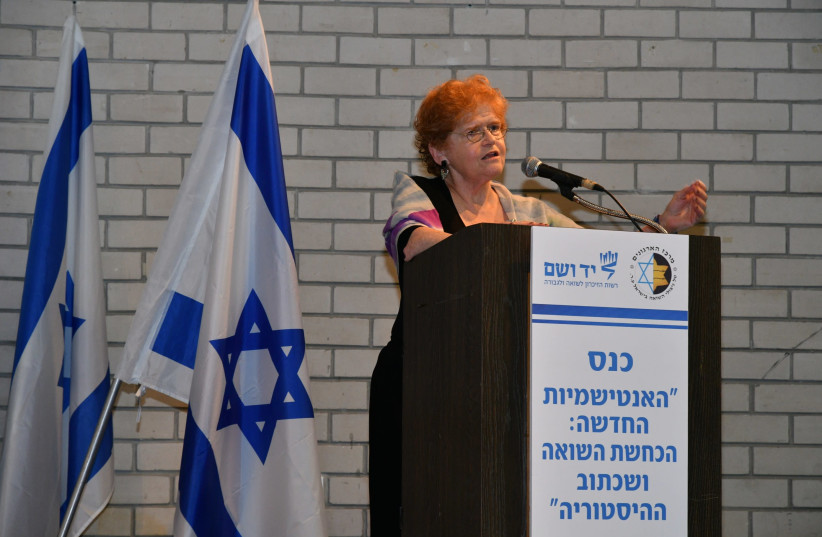In just a few weeks, the world will pause to commemorate International Holocaust Remembrance Day on January 27. This day was only formalized in 2005 when Israel proposed its first-ever resolution to the United Nations General Assembly (UNGA). Despite the outrageous bias that Israel faces at the United Nations (UN) across its various bodies, every once in a while, the UN gets it right.
Undoubtedly, establishing a day for the commemoration of the Holocaust was an important global step. Now, Israeli Ambassador to the UN Gilad Erdan is bringing another important issue to the UNGA, proposing Israel’s second-ever resolution, aimed at combating rising Holocaust denial – including on social media.
In 2020, I led the social media campaign #AdoptIHRA to pressure social media networks to adopt the definition of antisemitism by the International Holocaust Remembrance Association (IHRA) as a basis for combating hate speech. This campaign came on the heels of an ongoing massive rise in online hate speech and antisemitism in various forms. From antisemitic COVID-19 conspiracies, incitement to violence against Jews in Israel and abroad, to Holocaust denial and distortion.
While the platforms have not yet implemented the IHRA definition in full, Facebook, TikTok and Twitter did ban (at least in principle) Holocaust denial as a result of the pressure.
Yet today, social media continues to be a major source of antisemitism in the form of Holocaust denial and distortion, and tackling it requires fighting back on multiple fronts. True, social media platforms hold the majority of the responsibility to remove Holocaust denial, but the countries of the world should also step up and hold these companies accountable for the hate they allow to proliferate.

As of now, there is no international consensus on what constitutes Holocaust denial or distortion. For example, what should be done about content that praises the Holocaust or says that Jews are responsible for their own genocide? What about content that declares that the claims of the Holocaust are exaggerated, what Jews are doing today is the same as the Nazis, or that Jews were not the primary targets of the Nazi regime’s Final Solution?
That’s where this resolution steps in. Ambassador Erdan’s resolution, supported by Israel and Germany, focuses on establishing an international consensus of Holocaust denial antisemitism based on the IHRA definition and calls on UNGA member states to take action against online Holocaust denial in their countries.
The IHRA definition is critical to Holocaust denial because it addresses the classical forms of antisemitism as they relate to the Holocaust, it acknowledges modern antisemitism, and how Holocaust distortion and denial has morphed into a new form of malicious hate under the guise of anti-Israel and anti-Zionist activities.
If you don’t see the connection, look at recent events. The Jewish community around the world is sounding the alarm, but the public isn’t learning the lessons of the past. In the aftermath of the Gaza war in May 2021, Jews in the diaspora were harassed, beaten in the streets, cursed at, spat on and threatened – with 60% of American Jews reporting they experienced some form of antisemitism during the operations in Israel.
Where does such vitriolic hatred against Jews come from? In part, the hatred comes from ignorance. In the United States, 63% of millennials and Gen Z don’t know that six million Jews were murdered in the Holocaust, one in ten have never heard of it and 3% deny it occurred altogether. Sadly, it’s not just the US. One in twenty Europeans have never heard of the Holocaust, a third of them believe Jews use the Holocaust to advance their own goals and many believe that commemorating the Holocaust distracts from other atrocities today. In the Arab world, Holocaust denial and distortion is the norm, though trends are changing with the Abraham Accords.
While it’s true that Holocaust denial is already illegal in some countries, it’s time for an international consensus and a cohesive, multi-layered approach to dealing with one of the biggest challenges in Holocaust education today: Online antisemitism.
The UN must take a stand on this issue for the sake of the six million Jews who were murdered by the Nazis and for the sake of humanity. Only by remembering the past can we ensure history doesn’t repeat itself, for anyone.
The writer is the CEO of Social Lite Creative.
